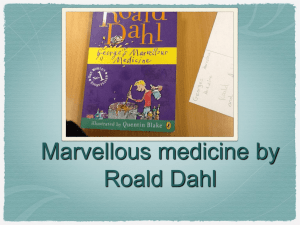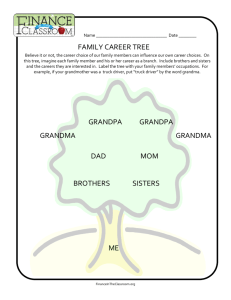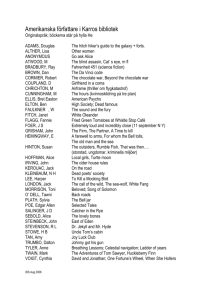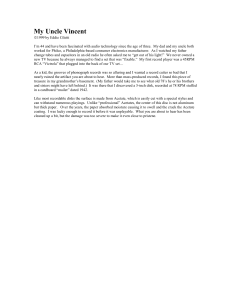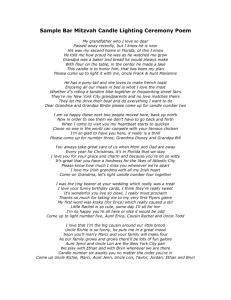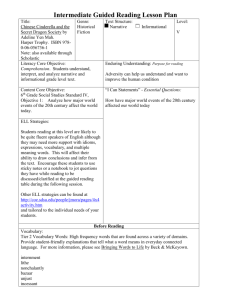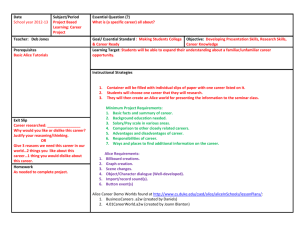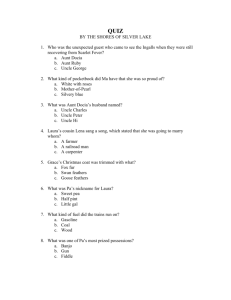Memories of my father, James Palmer Calkins, and mother Alice Allsop
advertisement
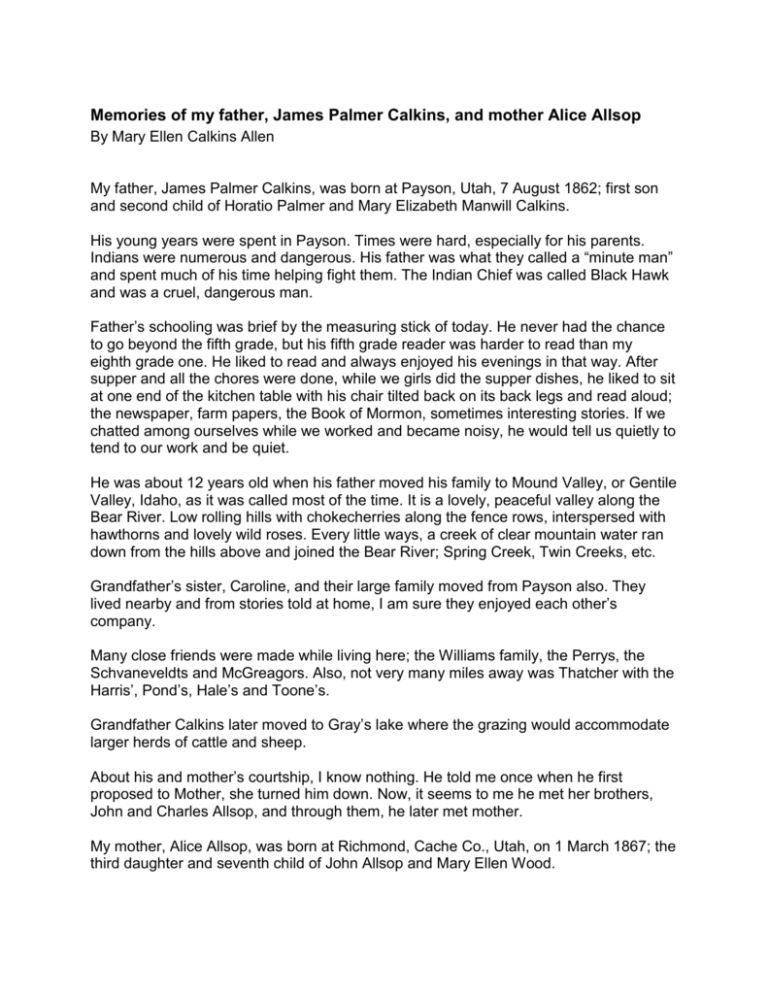
Memories of my father, James Palmer Calkins, and mother Alice Allsop By Mary Ellen Calkins Allen My father, James Palmer Calkins, was born at Payson, Utah, 7 August 1862; first son and second child of Horatio Palmer and Mary Elizabeth Manwill Calkins. His young years were spent in Payson. Times were hard, especially for his parents. Indians were numerous and dangerous. His father was what they called a “minute man” and spent much of his time helping fight them. The Indian Chief was called Black Hawk and was a cruel, dangerous man. Father’s schooling was brief by the measuring stick of today. He never had the chance to go beyond the fifth grade, but his fifth grade reader was harder to read than my eighth grade one. He liked to read and always enjoyed his evenings in that way. After supper and all the chores were done, while we girls did the supper dishes, he liked to sit at one end of the kitchen table with his chair tilted back on its back legs and read aloud; the newspaper, farm papers, the Book of Mormon, sometimes interesting stories. If we chatted among ourselves while we worked and became noisy, he would tell us quietly to tend to our work and be quiet. He was about 12 years old when his father moved his family to Mound Valley, or Gentile Valley, Idaho, as it was called most of the time. It is a lovely, peaceful valley along the Bear River. Low rolling hills with chokecherries along the fence rows, interspersed with hawthorns and lovely wild roses. Every little ways, a creek of clear mountain water ran down from the hills above and joined the Bear River; Spring Creek, Twin Creeks, etc. Grandfather’s sister, Caroline, and their large family moved from Payson also. They lived nearby and from stories told at home, I am sure they enjoyed each other’s company. Many close friends were made while living here; the Williams family, the Perrys, the Schvaneveldts and McGreagors. Also, not very many miles away was Thatcher with the Harris’, Pond’s, Hale’s and Toone’s. Grandfather Calkins later moved to Gray’s lake where the grazing would accommodate larger herds of cattle and sheep. About his and mother’s courtship, I know nothing. He told me once when he first proposed to Mother, she turned him down. Now, it seems to me he met her brothers, John and Charles Allsop, and through them, he later met mother. My mother, Alice Allsop, was born at Richmond, Cache Co., Utah, on 1 March 1867; the third daughter and seventh child of John Allsop and Mary Ellen Wood. Richmond is located near the northern boundary of Utah about ten or twelve miles south of the Idaho State line and nestled against the beautiful rolling hills at the foot of the Wasatch Mountain Range. Her parents joined the L.D.S Church over in old England and came to Utah with a company of Mormon Emigrants in 1854. Her father was a carpenter and cabinet builder by trade. He died when Mother was a little girl nine years old. Her mother never remarried. About her childhood days, we know very little now. The bits of information I put here are gleaned from my memory of little things she told me off and on while I was a child myself. Grandmother was a fussy housekeeper and taught her girls that cleanliness is next to godliness, and while Mother wasn’t fussy about her home, she was spotlessly clean. What I mean by this, she couldn’t tolerate dirt or messy ways of doing things, but didn’t take the joy out of life by insisting every little thing be put in place as soon as it was used. What we did, we did well. She often talked of a Mrs. Paul she worked for when she was a young lady. She must have liked this Mrs. Paul very well from some of the things she told us. While here, she bought herself a sewing machine called and Eldredge. She still used this after I was married. Father and Mother were married at Grandma Allsop’s home in Richmond, Utah on 10 December 1888; Brother W. K. Burnham performing the ceremony. Father’s people lived at Gray’s Lake near Caribou Mountain. It was in Bingham County. The post office was at Herman, north of the lake. Our homestead was in Bannock Co., now Caribou Co., just south of Grace at a little place called Niter. At Herman, in Gray’s Lake, my oldest brother, James Elmo, was born on 11 December 1889, just one day after their first wedding anniversary. On 1 March 1891, a little premature brother, Albert, was born and died a few hours later. Then, I came along on 17 March 1892, their first girl. From the locations, they had moved around. Albert was born and buried in Mound Valley and I was born at Trout Creek, or Lago, as it is now called. I am quite sure that life was hard and the folks never had much to do with. I remember hearing them say that Father had worked at times for fifty cents a day. With a growing family, that wouldn’t have gone very far. My memory is that they always raised a garden and I can recall going with Mother in the wagon to take fresh produce to Grace to both her brother’s families and her sisters also. We had the water from the little spring in “The Hollow” to run on the garden and water in Grace was hard to get. I can remember going with the cousins in Grace to the River after water to use around their homes. It was a little over a mile to the Bear River from Grace. At that time, there wasn’t a bridge there. It is hard to believe these days as we fly along in cars. I recall going to Uncle Tom Allsop’s in Thatcher with Father in the wagon and we forded the river. Water came high enough on the wagon box to lift it up. A little more and it would have floated off from the running gears. The horses were starting to swim as we reached shallow enough water they could get their footing again. Father looked at me and grinned as it became apparent that all was okay; I guess he was getting nervous himself. Father raised wheat and took it to the grist mill, (wheat ground into flour). They’d speak of it as taking a grist to be ground. Mother was a wonderful cook and everything always tasted so good. I can’t remember them being short of things to cook. I suppose there must have been such times, but I can’t recall ever being hungry. I mean, “hungry with nothing to eat kind of hungry”. True, we ate bread and milk with honey or fruit for our suppers instead of hot meals. To this day, I prefer a light supper. In the seasons of gardens, we always had fresh vegetables; lettuce, radishes, cabbage, etc. to make salads, etc. Apples stored away for winter, also potatoes, squash, onions and such foods as could be stored away. Father would dig pits to put carrots and potatoes away from the frost, etc. They raised their own meat, pork (cured the hams and bacon, even smoked the hams) [We] had our own chickens and eggs. Mother always made their own butter. We didn’t buy those things at the store. No ready mixes in those days. Mother made her own wash soap most of the time. Washed on a board or later, an old machine that had to be turned by hand, (it was wonderful when we got that). I remember when the art of canning fruits and vegetables were a problem and jellies or jams, “preserves” they were called, was the main method used to take care of the fruit, then. As they learned how to can in glass jars without breaking them, Mother would do a lot. I remember some of the first attempts to can peas and beans, and some of the recipes in the farm magazines telling how it could be done with safety and success. Mother was a good nurse; she just seemed to have the knack of doing the right things when we were ill. So far to Doctors, and money so scarce the mothers had to learn the right way, or else. No serums or inoculations around us in those days. Some handy grandmother would come to assist with the deliveries of the babies and help to lay away the dead when they were called away. I can remember my parents going to “sit up” with some ill neighbor. No undertakers, either. When death visited some home, some neighbor would go to sit up through the night to watch and see that all was taken care of. If ice could be had, they kept it packed around the bodies and had cold, wet cloths around on the body. This was necessary because there were no mortuaries or funeral homes. Even Drs. were many miles away and would be brought many miles by someone riding on horseback or buckboards, (sort of light wagon), maybe in a rush case they would borrow extra horses to relieve an over-jaded team or saddle pony. On 15 December 1894, Alice was born at Trout Creek, and on 22 November 1896, a little sister, Mildred was born at Thatcher, a little town near the Bear River, close to where Uncle Tom Allsop lived. In the spring of 1898 the folks made the necessary arrangements to go to Logan, Utah to the temple. I can recall Mother being busy sewing white dresses for we three girls and a white shirt with knee pants for Elmo. We rode in the covered wagon with a springseat on t and I suppose there was a place in the bottom of the wagon-bed for tired children to take naps, as that was the usual procedure. I remember it rained on us the first day and we stopped in Mound Valley at the home of Joe Schvaneveldt’s. Father figured we should go back and wait for the weather to clear. After discussing it, however, they decided it may be a long time before they would get started again. So, on we went. Roads were poor and not even graveled. Mud rolled up on the wheels until the horses had to struggle to drag it along. Father cut a little paddle and would stop every little while to dig the heavy blobs of clay mud from the wheels. Grandma Allsop still lived at Richmond. She went on with us to Logan. We stopped with Father’s cousin who was staying in Logan going to school. The next morning, Father and Mother went to the Temple. Grandma dressed us children later and took us over to be sealed to them. I recall, she dressed Alice and Mildred in their white dresses, but put a colored dress on me. I asked if I could wear mine also, but she said, “Ah, my no, Mary, you are too big a girl to be on the street in a white dress.” I was just a month or so past six years old. I don’t seem to remember anything about our return trip back home again. On 1 January 1899, a little brother, Charles Wood, was born. Grandmother Calkins was with Mother and stayed until she was up and around again. This little brother died 11 May 1899, just a little over four months old. Alice and Mildred both had whooping cough at this time. Alice coughed especially hard and invariably would hold her breath, sometimes we despaired of her catching it again, and this would frighten Mother terribly. The following winter, Grandma Calkins suffered a stroke which left her partially paralyzed. Father took Mother and us four children to Gray’s Lake to help care for her. How long we were there, I can’t rightly remember, but in March 1900, Grandma suffered another stroke and passed away in a few days. Mother was expecting a new baby that spring. She did the necessary part of preparing the frail little body for burial and Father, Grandfather, and some of the Uncles left for Grace with the remains of our sweet little Grandmother. Mother waked me (I was eight years old) to see her once more before they took here away. Grandfather’s sister lived at Grace and they took her there, stopping at Soda Springs to buy the burial clothes and casket on the way. Their final preparations for burial were completed at Grace. The men folks, or their friends, in those days would help each other dig the graves and sometimes would also make the caskets, etc. What flowers, if any, were home grown and in the summer or fall they had many, while in the winter months, they would consist mostly of treasured blooms from someone’s house plants. She was laid to rest in the little cemetery where her youngest son, Albert, was buried in January 1898. After Grandma’s passing, Grandfather felt so alone and he persuaded Father to stay there. So, Father took up a desert claim and we lived near by. Three years later, Grandfather passed away in an Ogden hospital with cancer of the stomach. The folks stayed on a few years more, but Mother worried about us children being so far from church activities, so they returned to our homestead in Gentile Valley. In the spring after Grandmother passed away, Mother had a new little son born to her. They named him Palmer. Then, a few weeks before Grandfather passed away, another son, Seth Reuben, was born. He was just a month old when the folks were called to go to Grandfather’s funeral. Grandfather was buried in the Lago Cemetery by little Grandma and Uncle Albert. Soon after we moved back to Niter, another little premature brother came to us, but only stayed a few hours and went back again; making thee Mother had lost. Sister Gibbs, our only neighbor, helped Mother with the baby. Not many months after this, Sister Gibbs became very ill and Mother about ruined her own health trying to keep both places going at once. Sister Gibbs passed away in June after a long drawn out siege. The next year, father built us a home with three rooms up on the east end of the home on the highway. What a lot of hard work to get the timber from the mountains and build it up. We hauled drinking water form the spring where we had lived before. A ditch east in the field now supplied water for culinary purposes and for awhile we also hauled water from the ditch to pour on the trees he planted around the house and corrals. Planted grass and the flowers and trees flourished, but we still hauled the drinking water. This would have been about the year 1906, because in April of 1907 our sweet little sister, Loretta, was born. How we loved her, a little sister after so many little brothers. In the wintertime following, Mother’s brother, Charles, came to see us on a visit. When he returned to his home in West Jordan, Utah, he invited me to go home with him for awhile. The folks consented and in the latter part of January 1908, Father drove the team on the sleigh and took me to Uncle Tom’s in Richmond where I joined Uncle Charles and we rode the train to Salt Lake City and took the interurban streetcar to Midvale (East of West Jordan) and some of the family came for us there. It was my first ride on a train. Uncle Reuben and family lived next door to Uncle Charles an Uncle Joseph not far away. I was there two months, but Mother Father were having their troubles at home. Whooping cough broke out in the little community and our little people hadn’t had it; Palmer, Seth, and baby Loretta. Palmer was nearly eight years old, but hadn’t been very strong and it was hard on him. Mother said the other two were doing fairly well. Then, Elmo was exposed to measles at school and was really quite ill with them, and of course, exposed them all. Mother wouldn’t send for me because I’d never had them, either. So, now, with Elmo, Alice, and Mildred and the three little people all down with measles at once. Elmo Contracted pneumonia and so did Palmer and Loretta. Grandma Allsop was with them also and wasn’t well. How our dear parents weathered that siege, I’ll never know. Little sister passed away on the Monday morning of 23 March 1908, and Mother wrote a letter telling me and they buried her Tuesday. Palmer also died on Wednesday, 25 March 1908. They sent me a message to come home. Uncle Charles accompanied me home. Johnny Gibbs, a neighbor, met us in Preston. Roads were terribly muddy and made travel slow and tiresome. He had driven down in a little oneseated buggy. I didn’t know until I got home that baby was buried. I can’t write about it even now without tears blinding my eyes. They held the funeral for palmer that afternoon. No mortuaries or any place to take care of such things; our home small and so much sickness. For fear of me getting measles, Mother had washed and dried enough bedding to make me a single bed in the kitchen and tried to keep the others from getting too close. It was useless, because Seth wouldn’t leave me a minute, but I never took them anyway, so it was okay then. While talking with Mother about the children’s illness, she told me she was holding baby Loretta in her arms, (on Monday morning about 7 a.m.) when Palmer acted like he was going into a spasm of coughing. As they were so severe, she knew he’d need help, so she went to babies bed and put her in it and turned to him, only a few steps away, but was surprised to see the look upon his face; one of wondering awe. He looked at her and smiled and said, “Oh, mama, see the beautiful lady by the baby.” She said she knew at once she’d find little Loretta gone when she got to her. She was sure he was close enough to the veil to see whoever came to lead the dear little spirit away. She said he also seemed to be in a semi-coma condition from then on until he too was called away on Wednesday morning. Poor Mother was tried very sorely that year. During the haying season, Father and Elmo were helping a neighbor with their hay and while cutting the last of one piece, Father met with a severe accident of mysterious origin. Elmo found him by his machine unconscious, one eye almost out of his head, jaw broken and bleeding from one ear. He didn’t regain consciousness for almost three weeks. Relatives, friends, and neighbors helped watch over him day and night. Grandma was also bad at the time and someone had to sit with her also. It never was learned what had caused the accident. That fall, on the advice of Dr. Kackley that Mother take Father on a trip, they drove a team and wagon to West Jordan, Utah. When they got there, Mother’s three brothers talked them into coming down to spend the winter. So, they left Alice and Mildred there at West Jordan and brought Seth back with them, put their affairs in order and drove back again. It was then getting near winter time. Elmo and I remained home finishing up a few things Father didn’t have time to take care of and we rode to Preston with a neighbor and took a train from there to Salt Lake City where Father met us. The folks rented a house in Sandy and we children attended school there. Elmo went to work at the smelter in Midvale where Uncle Reuben was working. Uncle Reuben had moved to Sandy from West Jordan and lived a quarter of a mile from us. We were there until in March when the folks in Grace wrote for Mother to return home and care for Grandma Allsop again. Mother, with Alice, Mildred, Seth, and Elmo, again made the trip back home, leaving me at Uncle Rube’s to finish my school year. After school was out, I came home on the train. Elmo was going with Stenna Mann and they met me at Alexander in the buggy. Father was with Uncle Charles working on a job in Utah. I stayed at home all summer and helped with chores, taking care of Grandma, who was bedfast, etc. Elmo was working with some of the neighbors. Grandma was very heavy and while she never complained, it was hard for her to be lifted and moved. Mother was expecting a new baby soon, so in September, Uncle John found a kind lady living at “Beaver Dam”, a little place near Turner, a few miles from Grace, that would care for her, and they moved her there. On 19 October 1909, Iris LaDell was born. Mother had an old neighbor lady help with the delivery. I was also present and, I can imagine, not much good either although I was 17 years old. We were thrilled to have another little sister. Father arrived home a few days later. Grandma passed away two and a half years later on 18 April 1911. They took her to Richmond, Utah, where services were held and she was laid to rest by her dear husband, John Allsop, in the Richmond Cemetery. Life for everyone was much harder in those days than now. Winter time, the men folks spent many cold nasty days in the canyons with tams and bob-sleighs getting out wood for both the winter and the year ahead. Father hauled out dry pine logs and green quaking asps. The pine logs he would saw up in stove length for the kitchen range. I often held one end of the long cross-cut saw and helped saw the large blocks of wood off. If they were straight grained, it wasn’t so hard to split them up into the right sized pieces to make the old stove cook Mother’s lovely meals. He would always cut a good supply of the very best in extra small sizes to use for “kindling”. That means pieces to build the fire up in the morning. He loved to sit and read by the kitchen table at night and his last act before going to bed at night was to go with his sharp pocket knife and cut nice long curly shavings from the kindlin’ wood, which, if the weather was damp, would have been drying out in the oven. Whoever was responsible for getting the wood in at night knew there was to be a certain amount and if the oven wasn’t in use that was where the kindling belonged. If it were, then they were to be very neatly stacked against the side of the range on the floor and put in the oven later. This way, you could be sure of the fire starting quickly in the morning. Many times, when the men were working in the canyon, we have been very worried when darkness would come on, maybe a storm, also, and sometimes the bitter cold wind would be piling the drifts up high. Mother would watch the road and be so worried until we’d hear the jingle of the sleigh bells or if he hadn’t taken the bells, it was a good sound to hear the creaking of the runners on the snow or the chains dangling on the ends of the tugs. I’ve seen him come in the house with frost frozen on his eye brows and when he wore a moustache, icicles hang from the ends of it. Sometimes, his trousers would be frozen so stiff he couldn’t sit down or bend until he had thawed out a little. We at home would try to have all evening chores taken care of and help get the team cared for and all in out of the cold as quickly as was humanly possible. As I set here now, by my heater and think of those days, and make comparisons with now, I can hardly make myself believe I’m not dreaming. Just a turn of the tap and I have hot or cold water, move the thermostat and have warmth if I want it. Press a button, and there is light. No smelly kerosene and smoky glass chimneys to make a light. I’d like to make you young people understand how it was, but it isn’t easy to do. Haul the water in barrels on what we called a “go devil”; just a couple of small logs for runners with boards nailed across the top. It carried two barrels and sometimes one. We’d fill them from the spring with buckets; turn a tub over the top so the water wouldn’t slop out. We’d lead the old horse and walk home with the water. We were lucky, as we only had maybe a couple of miles in all to go, maybe one and a half. Then, carry it in the house and put the buckets on the bench by the stove. On the back of the stove was a reservoir that held a couple of buckets full. If a fire had been going long enough, we’d have hot water; if not, then we made a fire. I have told you about the wood, but it would take at least 10 or 12 trips to the woodpile to get enough in for the night if it was wintertime; and remember, this had to be cut first, ashes to be taken out, and the mess to clean up. Don’t you children of today have a hard time when you have a few dishes to wash. There were no electric lights when I was Grandma’s little girl. We had no television or radios, no picture shows. On Saturday evenings in the old tin tub would come in and all took turns having their baths. The boiler would come in use to supply enough hot water to let all have enough. Shoes were polished ready for Sunday school. If there wasn’t any shoe polish, we had a little secret on how to make some. The back lids of the kitchen range would be turned over. We would scrape a little pile of the soot together, (it had to be wood soot, as if we were burning coal, that wouldn’t work), add a teaspoon full of sugar and water enough to make paste, put it on our shoes and then polish with a soft rag. Results: very nice shine and easy to do. We children were happy and we always attended Sunday’s schools and primary I don’t think we missed going very many times. Sacrament meetings were held after Sunday School; people didn’t have the cars and it was too far to drive teams or buggies or wagons twice. We always had family prayers at our home. All the family would be up, dressed and ready for breakfast. We’d kneel by and around the breakfast table and have prayer before week ate, usually the same at night around mother’s bed. We children never went to bed without saying our prayers. We always had good times on July 4th and twenty fourth, Independence Day and Pioneer day. A good program in the church house and the games and races in the outdoors afterwards. When I was small, everyone around would sometimes take large picnic lunches and go to the canyons where someone on the committees would have a bowery built with seats, etc. Then the program would be held and large barrels of lemonade and huge freezers of ice cream for all. Christmas time, the community had a tree with a program and Santa. When Easter time came, the Easter egg hunts were the big event. I remember as a child how mother allowed us to collect and hide eggs we found in the nests for a couple of weeks before the big day. How tickled we’d be to find the cache of the others and take them, especially if it were Elmo’s. He being the oldest and strongest, we were at a disadvantage in trying to compete with him anyway. I can still see the way Mother helped us to decorate the eggs. When we older ones were little, there was no dye so she showed us how to wind colored wool yarn on; they came out with pretty stripes if we were lucky. Onion peelings cooked with the eggs made a pretty shade of brown. Shortening rubbed on in the shape of a letter or whatever would keep the colors from setting. Thus, they would come out with our names written on them. We also had a large tree of very red apples. I like to paste strips on a large green apple. When it was beautiful red, I pulled off the strips and there would be my initials on the apple in a pale green. The hills on both sides of the “hollow” made a lovely place to sleigh ride on as also did the one where the school house sat out in Gray’s Lake. A full chapter could be written about that if this were my story and not my parents. The spring after Grandma Allsop passed away, Wedding Bells started to chime. Well, anyway, we started getting married. I was first. On the 7 June 1911, Lorenzo P. Allen and I were wed. We drove to Richmond, Utah, where Loren’s folks lived and took the train to Salt Lake City. We took Mother with us, and visited with Uncle Charles and Uncle Joe’s families, both of which were then living in Salt Lake. Aunt Rose, Uncle Charles’ wife, wasn’t home. She was in Midvale helping care for Cousin Mabel’s little new twin babies, a boy and a girl. I wasn’t a very pretty bride. During January, February, and March, I had had a bout with typhoid fever; I was skinny as a picked crow. My hair had fallen out something awful and even had a bald spot at the crown. Loren asked his mother, “Well, Ma, what do you think of her?” She answered truthfully, “Well, she’s not very good looking” (He told me later). We were married in the beautiful Salt Lake Temple. I’d always planned that was where it had to be done. I think I’d have stayed single if I couldn’t have been married there. As it was June Conference time, the place was packed. We went in at 8 a.m. Only one session, it was 5 p.m. when we got out, but many were as late as 8 p.m. Next was Elmo. He and Alice Stenna Mann were married on 8 November 1911. On 18 June 1912, our first baby was born; plump little Lois. How we did lover her. Then, Geneal was born on the 6 November 1912 to Elmo and Stenna. My Mother’s two cute little granddaughters. Again, the stork visited us. This time a boy, Louis Calkins Allen, born on the 25 May 1913. Two babies in less than a year. You’d have thought Alice would have been afraid, but three days after Louis was born, on the 28 of May 1913, Alice married Chester S. Christensen in Preston, Idaho, his home town. Next to go was Mildred. She married Albert F. Ray at Preston on 31 August 1916. She had met him while on a visit to Mother’s half sister, Aunt Josie, in Blackfoot, Idaho. The grandchildren all loved to go to Grandma’s, she baked such lovely cookies and always had time to cut them in pretty shapes to please the kids. And the honey taffy she would pull until it looked and tasted so wonderful, and colored in all the pastel shades. She had lots of patience with the children and when she made cookies, they were allowed to cluster along one side of the table where they could watch as she rolled dough, sprinkled sugar and cinnamon and cut the pretty shapes. On occasions, some little hands previously scrubbed clean were allowed to place the circles of dough in the pans or take a peek to see if the ones in the oven were browning nicely, use a fork to print little dents on the fresh cut ones. This was as big a treat for them as eating them afterwards. Mother had a keen sense of humor and in spite of all the sorrow that she had gone through, she didn’t become bitter. She never faltered in her love for the Gospel and her faith in our Heavenly Father. She loved her grandchildren and they all liked to go there, I know mine did. She’d treasure up their little acts and sayings. On one occasion, Elmo and Stenna had left Geneal and Winona with her for awhile. They were teasing to do something, Mother had said, “no.” They continued to coax and Winona said, “Oh, come on, Geneal, Grandma’s not like Mama, when she says no, she means no.” Mother took Lois home with her one time when Marion was so sick with Pneumonia. She and Iris were out playing by the pond not too far away from the house. Bill Turner came along with some cattle he’d been buying. One wild steer crashed through the fence and took straight towards the children. Iris could take herself out of harms way but Mother flew to get Lois and help Iris to hurry. She said they would never have made it, but the geese raised a fuss; came running and squawking and hissing. The wild steer turned and charged after the geese and all was well. Iris made this comment about the pond: “I always loved that pond. The ditch that carried the canal water down past the house that we used for washing, emptied into that pond. Father dug it. It was out in the barnyard. There was a fence around the house, lawn and garden that separated the barnyard from the dooryard. The house in the background on the picture is Gibb’s home, so you are looking west. We had just planted those trees when Mildred took the picture. How the geese loved that pond. About the year 1919 Father and Mother decided to let Mildred and her husband, Albert Ray, work the farm. They moved to Preston and rented a little place not too far from Alice and her family. In the summer, Father was making preparations to work at the Whitney sugar factory when the campaign started. He had a hernia for years and it was necessary to have this repaired before he went to work. The Dr. came to the house and talked with the folks about the operation. They set a date and he rigged up an operating table at the house, using the sowing machine and the kitchen table. He used a local anesthetic and with Mother’s help, repaired the hernia. Father raised his head once in awhile to watch the Dr. work. Mother cared for him until he was well again. In the fall of 1921, Father worked at the sugar factory at Lewiston, Utah, not far from Preston. One day, as he was busy at the station where the sugar beets went through the washing process (it was a large vat like place with could water running through and the beets were constantly moved about and stirred with large paddles that turned around and around, something like a water-wheel) the beets became clogged and he was trying together them loose with a pole used for that purpose and he slipped and fell into the vat. Being unable to get out without help, he was turned over and over three times with the beets before the machinery could be stopped. One more turn and he would have been carried into the “worm” where the beets began to be cut up. He was pounded black and blue all over, had six broken ribs and the hernia that had been repaired was torn open again. He was taken home to Mother in that condition and she cared for him herself. The company paid no compensations or anything. The only good that came from it was a rail on the vat to prevent any further such accidents. Mother’s health commenced to leave her. She got Bright’s disease and her blood pressure became high. From Christmas time in 1924 until May 1925, she was very bad with Asthma and bronchitis. She’d cough until she was exhausted and fight for her breath with the asthma. Her kidneys failed her and she became dropsical; feet and legs were all swollen up. To make it worse, she took a slight stroke and only was with us for two more weeks. She passed away in Grace, 19 May 1925. She was buried in the Lago Cemetery where the little brothers and sisters are sleeping and also Grandpa and Grandma Calkins and Uncle Albert. Twelve years had passed away since Mildred and Al were married, bringing joys and sorrows to us all, chief among them being Mother’s severe illness and her death. Iris finished her high school. In her Senior year, the Seminary program was started in Grace. As she wanted to take Seminary, it was necessary for her to take all three subjects along with her regular courses, which she did and graduated. We decided she should take Nurses training and helped her get started. She attended two months, then she and Elmer W. Raat drove over to Bountiful, Utah, and were married on 6 October 1928. Two years later on Christmas Eve of 1930, Seth married Blanche J. Holmes at Soda Springs, Idaho. Father struggled on for twenty-one years without Mother. I know he missed her badly. I’m sure he loved her very much. As we girls grew up, he would come to wake us (if she’d had a bad night or a headache) and tell us to attend to the morning chores and keep quiet because she wasn’t feeling well. She wanted us to keep in school and would rather do the work herself than keep us out to help, but Father wanted us to help when she wasn’t well. I never remember them having trouble. He was affectionate with us and with Mother. A loving goodbye kiss and the admonition to “be good and help Mother” if he ever left for a few days. Same with Mother. I think we all went to bed with goodnight kisses. Father had a good singing voice and he and Mother sang a lot. He would sit in the old rocking chair with a kid on each knee and he would sing many songs we loved. Mother joined in as she helped prepare supper. A few years after Mother passed away, Father married his cousin Albert Manwill’s widow, Lucy. I wasn’t around them much at the time as I was busy with my own family. She only lived a couple of years. Father had been hard of hearing for a long time. His accident while haying had made it worse. When we were young, we used to joke about being able to get in without disturbing him if he was sleeping on his “good ear.” Finally, he became so bad it was impossible to make him understand us. Poor old dear, he would sit looking so left out while we visited or talked among ourselves. His eyes were good, and while he used glasses some, he seemed to read a lot without them. After we moved to Rupert, Idaho, and Seth and Elmo lived in Burley, just nine miles away, he stayed in Preston with Alice. Then, after awhile, he lived in a little trailer house near Seth for a few years. During the last part of April 1935, Elmo met with an accident while working in the sugar factory. He passed away on the 18 June. Poor Father was so broken up. I can hear him say yet, “Why couldn’t it have been me? I’m no good to anyone.” The Second World War began in 1941 and Alice and Chess moved into one of the apartments in Ogden belonging to Iris and Elmer so they could work in Ogden. The two girls, Iris and Alice, fixed up a small apartment next door to the one Alice used for Father to live in. The Girls saw to it that he had proper meals and clean clothing. He always was particular about his appearance and he shaved each morning, etc. He would read by the hour. He liked Zane Grey stories and as we said, “ate them up.” He passed away there in Ogden with cerebral hemorrhage (wasn’t sick very long) on the 19 December 1946. We took his body to Grace to George Allsop’s home. George’s wife, Eliza, said, “Uncle Parm always came to my place when he was alive and I want him to come now.” We were very grateful to them, as none of us lived in Grace at that time. Funeral services were held in the Grace Bannock Stake Tabernacle. Speakers were Alf Toone, Michael Mickelson, Don Clegg, and Father’s cousin, Mana S. Snow, asked to say a few words also; all close friends of our folks. All spoke of their love for him. He was buried in the Lago Cemetery by Mother with his Father and Mother, his younger brother, Albert, and our brothers, Charles, Palmer, and Vernon, and little sister, Loretta, all close by. It is a quiet spot; Trout Creek just below the little slope and the rolling hills to the east. I’ve always loved the little place and like to walk among the graves and pay silent tributes to the memories of a lot of dear friends I can remember that used to visit with my parents years ago when I was a child. My prayer always is that they may rest in peace and I thank my Father in Heaven for sending me to live in their home where love abounded and even if worldly goods were scarce, we were taught to live clean lives, be honest in all our dealings and not be afraid to work. They didn’t send us to church, they took us. Taught us to always be early wherever we went. Yes, I thank my Father in Heaven for my goodly parents Mary Ellen Calkins Allen
